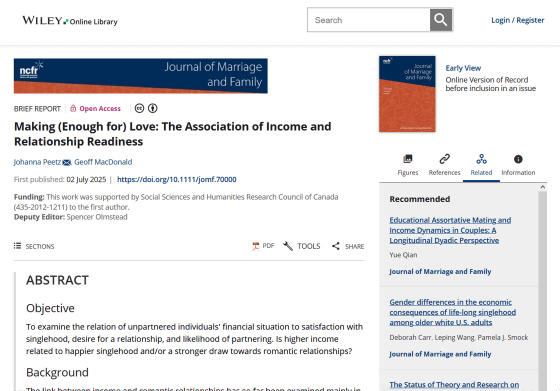High-income singles are more likely to find love within a year

In modern times, people are getting married later in life, especially in developed countries, but there are probably some single people who don't 'want to get married' and would like to get married if they had the chance. A new study that looked at the income and relationship status of single people revealed that single people with high incomes were more likely to start dating within a year of the survey.
Making (Enough for) Love: The Association of Income and Relationship Readiness - Peetz - Journal of Marriage and Family - Wiley Online Library

Higher income may boost the odds of finding a romantic partner
https://www.psypost.org/higher-income-may-boost-the-odds-of-finding-a-romantic-partner/
Single-person households have become more common in recent years, with almost half of adults in the United States reported to be single, and one-person households are the most common household type in Canada. However, most research on income and relationships has focused on married people or couples, and little is known about how income affects the lives and attitudes of unrelationship-dating people.
So researchers from the University of Toronto and Carleton University in Canada decided to look into whether financially secure single people are more satisfied with their single lives or more motivated to get into a relationship. Previous research has suggested that people want to be financially stable before getting into a long-term romantic relationship, but it was unclear how this affects single people.
The first study was conducted in the United States and involved 638 single adults aged 25 to 35 recruited online and asked participants about their annual income, satisfaction with single life, what they look for in a partner, whether they were ready to start a relationship, and how much they wanted to find a partner within the next six months. Approximately 60% of participants also completed a six-month follow-up survey to determine whether they had started a romantic relationship during that time.
The second study used data from the German Family Panel, a longitudinal study conducted in Germany. The data included 2,774 single people who reported their income, relationship attitudes, and relationship status over a 10-year period, allowing the research team to examine the association between changes in income status and relationship status one year later.

The analysis showed no association between high income and satisfaction with single life in either study, meaning that people with higher incomes were no more satisfied with single life than those with lower incomes.
On the other hand, higher income was associated with a stronger desire for romance, a sense of readiness to date, and a desire to start dating in the near future. A US study found that single adults with higher incomes had a stronger desire to find a partner in the next six months, and were significantly more likely to have started dating by the six-month follow-up.
A German study found similar results. Single people with higher incomes were more likely to want a partner, and were more likely to start a relationship within a year. The effect of income on the probability of starting a relationship was greater for men than for women, but there was no significant difference between men and women.
Interestingly, whether or not people's income had increased since the previous year had little effect on their desire to date or their actual relationship status. Current income level was more important, suggesting that financial stability, rather than short-term changes in economic circumstances, influences people's desire to date.
'I think young people are making rational calculations in a precarious economic situation,' said study co-author

The study only looked at the relationship between income and relationships, and individual personality, cultural values, and other socioeconomic factors may also have influenced the results. In addition, the studies were conducted in Western countries, which have relatively individualistic cultures, so the results may be different in cultures where marriage is more closely tied to family expectations.
Related Posts:
in Science, Posted by log1h_ik







